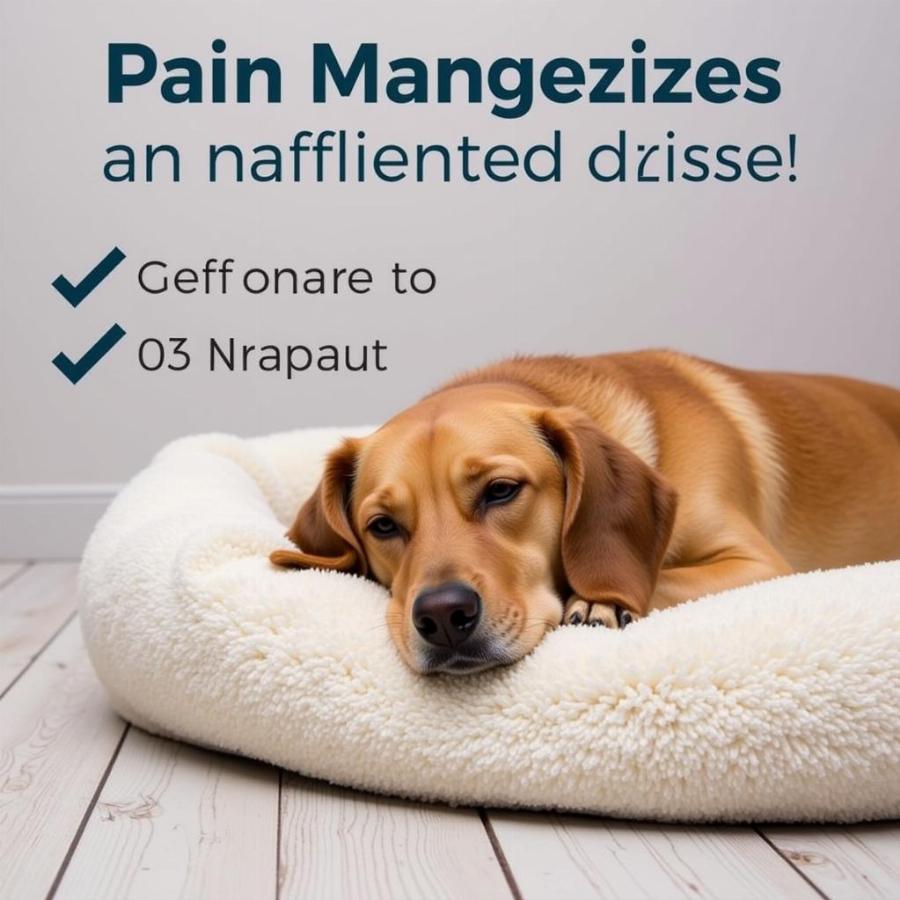Hydrocodone dog dosage is a serious topic that requires careful consideration and veterinary guidance. While hydrocodone can be an effective pain reliever for dogs, administering the correct dosage is crucial to ensure your pet’s safety and well-being. This article will delve into the complexities of hydrocodone use in dogs, addressing common questions and concerns surrounding proper dosage, potential side effects, and safe pain management practices. Understanding the risks and benefits associated with this medication is essential for any responsible dog owner.
Understanding Hydrocodone for Dogs
Hydrocodone is an opioid pain medication that can be prescribed for dogs experiencing moderate to severe pain. It works by interacting with opioid receptors in the brain and spinal cord, reducing the perception of pain. It’s often combined with other medications, such as homatropine methylbromide (in the brand name Hycodan) to help manage coughing as well. While effective, it’s crucial to remember that hydrocodone is a controlled substance and should only be administered under the direct supervision of a veterinarian. Never attempt to self-medicate your dog.
Determining the Correct Hydrocodone Dosage for Your Dog
The appropriate hydrocodone dog dosage varies depending on several factors, including the dog’s weight, age, overall health, and the severity of pain. Your veterinarian will conduct a thorough examination to determine the optimal starting dose and adjust it as needed based on your dog’s response to the medication. There is no one-size-fits-all approach, and giving the wrong dosage can have serious consequences.
Potential Side Effects of Hydrocodone in Dogs
Like any medication, hydrocodone can have potential side effects. These can range from mild to severe and include sedation, drowsiness, constipation, respiratory depression, vomiting, and in rare cases, seizures. It’s important to monitor your dog closely for any unusual behavior or symptoms while they are taking hydrocodone. If you notice anything concerning, contact your veterinarian immediately.
Safe Pain Management Practices for Your Dog
Effective pain management for your dog goes beyond simply administering medication. Providing a comfortable and supportive environment is crucial. This can include providing a soft bed, limiting physical activity, and offering gentle massage. Alternative therapies such as acupuncture and physical therapy can also be beneficial in managing chronic pain. Always consult with your veterinarian before starting any new treatment or supplement.
 Dog resting comfortably in a supportive bed for pain management
Dog resting comfortably in a supportive bed for pain management
What to Do in Case of a Hydrocodone Overdose in Dogs
A hydrocodone overdose in dogs can be life-threatening. Signs of an overdose can include slowed breathing, pinpoint pupils, extreme sedation, and loss of consciousness. If you suspect your dog has overdosed on hydrocodone, seek emergency veterinary care immediately.
Conclusion
Hydrocodone dog dosage is a complex topic that necessitates veterinary expertise. Understanding the proper dosage, potential side effects, and safe pain management practices is crucial for ensuring your furry friend’s safety and well-being. Always consult your veterinarian for guidance on managing your dog’s pain and never attempt to self-medicate. Responsible pain management involves a collaborative approach between you and your vet to ensure your dog receives the best possible care.
FAQs
- Can I give my dog over-the-counter pain medication instead of hydrocodone?
- How long will my dog need to take hydrocodone?
- What should I do if my dog misses a dose of hydrocodone?
- Are there any natural alternatives to hydrocodone for dogs?
- Can hydrocodone be used long-term for chronic pain in dogs?
- What are the signs of an allergic reaction to hydrocodone in dogs?
- How can I make my dog more comfortable while they are recovering from surgery or injury?
Related Articles and Questions
- Canine Pain Management: A Comprehensive Guide
- Understanding Opioid Use in Dogs
- Alternative Therapies for Dog Pain Relief
Beaut Dogs is your one-stop resource for all things related to dog care. We provide expert advice and helpful information on a wide range of topics, from breed selection to health and nutrition. When you need support, please contact us at Email: [email protected] for detailed and accurate answers. Beaut Dogs is committed to helping you provide the best possible care for your beloved canine companion. Visit us at https://beautdogs.com.